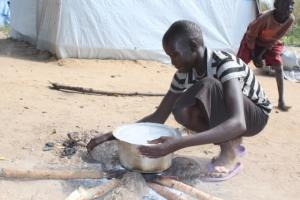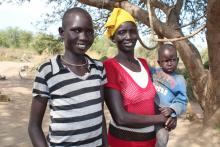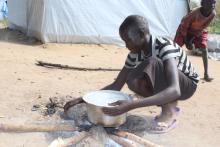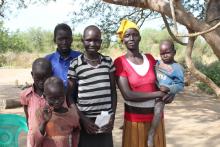South Sudan: Family encourages early diagnosis and treatment of Hepatitis after successful recovery
Aker Moyom Jok is all too familiar with death due to Hepatitis E Virus (HEV).
In 2014, the 29 year old mother of five lost her brother-in-law to the disease. So, when she noticed the signs and symptoms of HEV in her 13 year old daughter, Awel Wech Ayom, she immediately sought medical attention.
“I am grateful to health partners because this is a killer disease and some people have died, but my daughter is alive,” she says.
Narrating her story, Aker says it started at night when she noticed that her daughter was feverish. She was shivering and complaining of joint pain but in the morning she was fine. This was followed by severe back pain, vomiting, gastric pain and a severe headache.
Recognising the familiar signs of tooch – the local name for HEV, Aker rushed her daughter to the clinic, where she was eventually referred to hospital for further management.
Originally from Bor County in Jonglei State, Aker, a widow, is among the people who were internally displaced when conflict broke out in December 2013. She and her family now live in Mingkaman, a camp for internally displaced people (IDP) in Awerial County, Lakes State, with an estimated population of 71,367 people.
“Hepatitis E Virus remains a major public health problem among IDPs and has been confirmed in two out of eight IDP sites where Acute Jaundice Syndrome (AJS) cases have been reported,” says Dr. Allan Mpairwe, Head of Outbreaks and Disasters Management (ODM) at WHO in South Sudan.
As annual World Hepatitis Day is being commemorated throughout the globe on 28 July under the theme: "Prevent hepatitis. Act now," WHO is using the opportunity to raise awareness about the different forms of hepatitis, the risks involved in transmitting the infection, how the infection is transmitted, who is at risk and how to we prevent it and seek treatment.
According to WHO, Viral hepatitis is caused by five distinct hepatitis viruses known as Hepatitis A, B, C, D and E. The virus types cause infection and inflammation of the liver that can lead to severe disease and death. Hepatitis A and E are spread by poor food hygiene, unsafe water and lack of sanitation. The risk is higher in rural areas of developing countries. On the other hand, Hepatitis B, C and D are spread by blood, semen and other body fluids. Infection through all these routes of transmission can be prevented through proven and effective interventions.
In South Sudan, outbreaks of HEV have been reported in Lakes, Unity and Upper Nile states, especially among refugees and internally displaced populations. Cases of HEV were first detected in Doro refugee camp, Maban County on 14 January 2013. Since then a total of 1,203 HEV cases including 28 deaths (CFR 2.3%) have been reported from Doro refugee camp. In Unity and Lakes states, HEV cases have been confirmed among internally displaced populations in Rubkona and Awerial Counties respectively. The HEV outbreaks in Awerial and Rubkona counties started during the weeks of 3 March 2014 and 16 June 2014 respectively are still ongoing. Cumulatively, 106 HEV cases including one death (CFR 0.94%) have been reported in Bentiu, Rubkona County and 150 cases including seven deaths (CFR 4.7%) from Mingkaman in Awerial County.
Hepatitis B and C infections are endemic in South Sudan and known to be responsible for significant burden of disease in the country. Statistics from the national blood donors put prevalence of Hepatitis B Virus at 8.18% and Hepatitis C Virus at 5.60% (2011). Other studies estimate Hepatitis B at 13% and Hepatitis C at 8% among TB patients. However, most patients are unaware of their infection which could result into a fatal disease.
Dr. Moses Mutebi, Head of the HIV Programme at WHO South Sudan, emphasises that Hepatitis is preventable and treatable, and sometimes also curable. In order to prevent the infection, it is important to know the risks, use safe blood for transfusion, use sterile single-use syringes for injections and practice safe sex. Immunization programmes should be instituted and children encouraged to get vaccinated with pentavalent vaccine (with Hepatitis B), communities should be able to access safe food and water and adults to get tested for Hepatitis.
“Treatment is now available, and patients are encouraged to seek for care as early as possible,” he says, encouraging communities to seek early treatment. This was the case for Awel, who recovered and has resumed her life.
“I’m happy I can go to school again,” says the shy 13 year old, adding that she was not happy to miss school as she could neither learn nor play with her friends. WHO is supporting the Ministry of Health and partners to prevent and respond to cases. The organisation continues to play its role of technical support to the Ministry of Health through provision of guidelines on surveillance, prevention and treatment of Hepatitis. These include guidelines for persons with chronic Hepatitis B infection, guidelines for screening, care and treatment for persons with Hepatitis C infection, tools on the methods for investigating outbreaks of Hepatitis E, and measures for their prevention and control. WHO has also developed a draft global health sector strategy on viral hepatitis for 2016–2021 to support a series of multi-stakeholder consultations from February to December 2015. The strategy is closely aligned with the related global health strategies and plans, including those for HIV, sexually transmitted infections, blood safety and non-communicable diseases.
Aker is grateful to partners like WHO that are saving lives by supporting the Ministry of Health’s response to Hepatitis. She encourages health partners to continue the good work as it is making a difference in the lives of people like her.
“Without the support of health partners, my child could have died,” she says.
__________________________________________
Below (Photo credits - WHO/M. Moyo):
Awel Wech Ayom (left), with her mother Aker Moyom Jok encourage early diagnosis and treatment of Hepatitis as this can save lives.
Awel Wech Ayom recovered from Hepatitis E Virus and has resumed her life. Here she helps to prepare a meal for her mother and siblings.
Awel Wech Ayom (centre), with her mother Aker Moyom Jok and her siblings.






